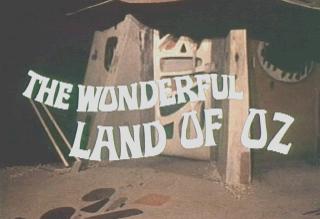

It seems impossible but it was two years ago
that I wrote a review for a Something Weird Video trailer compilation,
The Dusk
to Dawn Drive-In Trash-O-Rama Show, Volume 5, and of a
certain movie called The Wonderful Land of Oz I said, " Please, please, Dear Lord, let this movie be sitting in someone's
closet, somewhere. If I could have any movie ever made in the
whole world magically appear in my hands, it would be this one.
It is that unbelievable. "
Be careful what you wish for, you may get it.
The Wonderful Land of Oz didn't magically appear in my
hands; I had to pay cash money for the damned thing. Countless
children were also charged 25 cents to see this thing in theaters
back in 1969, and that was still too much.
This is one of those cases where a little background
information will be useful before I start spouting snotty comments.
In 1961, a Florida businessman named K.
Gordon Murray had a brainstorm, and created what came to be
known as "The Kiddie Matinee". Up until this point,
movie theaters on weekend afternoons simply played whatever was
scheduled for the evenings. Murray masterminded special shows
for children in those time slots and only those time slots,
with low ticket prices and heavy media campaigns. Parents could
dump their children at the theater for the afternoon, where the
sugarbuzzed lawn monkeys became the problem of the staff.
Murray entered into a production agreement with
Mexico’s Churubusco Studios to provide a supply of material
for the matinees, starting with the popular Santa Claus,
which is certainly a mind-melting experience, but not totally
horrible in the way of tonight’s picture. Santa
Claus proved so durable, it was still being shipped around
in the 80s! Many children were psychically mauled in the 60s by
other dubbed Mexican Murray imports like Puss N' Boots, Tom
Thumb (in serapes and sombreros!) Little Red Riding Hood,
Little Red Riding Hood and her Friends, Little Red Riding Hood
and the Monsters… well, you get the picture.
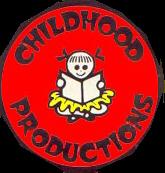 Murray
had a great deal of success with this arrangement -so much so
that NBC was even considering a Wonderful World of K. Gordon
Murray, similar to their Wonderful World of Disney (My
God! Just imagine!). Successful enough that imitators started
to crop up. The most (in)famous is Childhood Productions, whom
we can thank (?) for Wonderful Land of Oz. A New York-based
outfit, Childhood imported most of their stuff from Europe as
opposed to Mexico; and unlike Murray (who it seemed actually did
have a hand in producing his kiddie flicks), the only flick Childhood
was directly involved in was Rossano Brazzi’s The Christmas
That Almost Wasn’t.
Murray
had a great deal of success with this arrangement -so much so
that NBC was even considering a Wonderful World of K. Gordon
Murray, similar to their Wonderful World of Disney (My
God! Just imagine!). Successful enough that imitators started
to crop up. The most (in)famous is Childhood Productions, whom
we can thank (?) for Wonderful Land of Oz. A New York-based
outfit, Childhood imported most of their stuff from Europe as
opposed to Mexico; and unlike Murray (who it seemed actually did
have a hand in producing his kiddie flicks), the only flick Childhood
was directly involved in was Rossano Brazzi’s The Christmas
That Almost Wasn’t.
So we can’t totally blame them for
Oz. That dishonor goes to Barry Mahon, who has other cinematic
crimes for which he must answer. He made a series of kiddie movies
in and around the Pirate World amusement park in Florida while
also turning out more of his usual softcore fare, like Fanny
Hill Meets the Red Baron and Love Pirate. Next to Mahon
fare like Oz and Santa Claus and the Ice Cream Bunny,
Murray's Mexican imports do indeed compare favorably with Disney.
The major studios eventually pressured the theaters
into relinquishing the weekend afternoons back to them, and the
kiddie matinee vanished into a realm of memory populated by double
features, newsreels, and animated shorts. But while it was around,
it produced some amazingly horrid cinema.
First, if you were unfortunate enough to miss
The Dusk to Dawn Drive-In Trash-O-Rama Show, Volume
5, rest assured that you will not miss the trailer that so
engaged my sensibilities, as it is replicated at the very beginning
of the movie. Perhaps, just as Shakespeare's plays all begin with
two clowns arguing with each other over nothing, this is a device
to make the audience notice the show has started and hopefully
gravitate to their seats. Or perhaps Mahon was desperate to stretch
the movie out to over 70 minutes. (It's 71. Just barely.)
This preview/teaser segment also has the unfortunate
effect of letting you know exactly what you're in for: I said
this looks like a high school pageant laid to film, and this is
still pretty much the case, with minimalist sets, fairly decent
costuming, and a theme song that is far too reminiscent of the
Cracker Jacks jingle. If the children had not already squandered
their allowance money on Fizzy Pop and chocolate coated sugar
bombs, this sequence doubtless had them hitting the pay phones,
begging their parents to come rescue them.
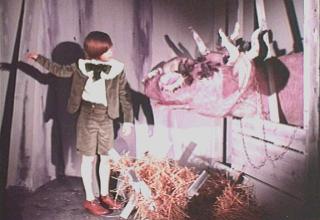 As
the movie itself gets underway, we find Tip (Channy Mahon, please
note the last name) constructing a scarecrow-like dummy with a
Jack-O-Lantern head to frighten his guardian, the witch Mombi
(Zisca) when she gets home. He explains this through expository
speech to the only other occupant of the barn: a papier-mache
purple cow, which is, frankly, beating Tip in the acting sweepstakes.
Take all the annoying child actors you have ever seen, leach them
of every single interesting trait they might have possessed, and
you will have Channy Mahon: monotonous, sing-song delivery, constantly
pulling up his pants during scenes, shuffling about when he is
not talking. A more generous critic would call him unaffected
or natural. It's me, though, so we'll just leave it at
awful.
As
the movie itself gets underway, we find Tip (Channy Mahon, please
note the last name) constructing a scarecrow-like dummy with a
Jack-O-Lantern head to frighten his guardian, the witch Mombi
(Zisca) when she gets home. He explains this through expository
speech to the only other occupant of the barn: a papier-mache
purple cow, which is, frankly, beating Tip in the acting sweepstakes.
Take all the annoying child actors you have ever seen, leach them
of every single interesting trait they might have possessed, and
you will have Channy Mahon: monotonous, sing-song delivery, constantly
pulling up his pants during scenes, shuffling about when he is
not talking. A more generous critic would call him unaffected
or natural. It's me, though, so we'll just leave it at
awful.
Mombi returns to her tiny soundstage home, walking
past a fence that appears to be an unfolded refrigerator box.
Not finding Tip in hovel #1, she proceeds to hovel #2, the stable.
There, she is indeed startled by Jack Pumpkinhead, but thinks
better of smashing him – instead she decides this is a good
opportunity to test out her Powder of Life, which "cost me an
arm and a leg!" She prepares to bring Pumpkinhead to life, prompting
competing reaction shots from Tip and the papier-mache cow. Once
again, the Cow wins.
Once Mombi's experiment succeeds, she has to tell
us about it in song. There are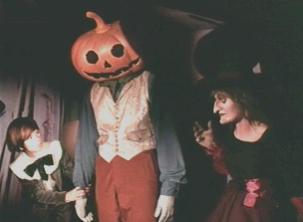 times I would like to climb into a time machine, find whoever
it was who decided that all children's entertainment must include
songs, and smack him upside the head with my cane. Or at least
make him sit through The Wonderful Land of Oz as many times
as I have. This particular song is A Witch Like Me, and
it details all the trouble the Powder of Life can get you into,
if you don't have the right training. Then again, the song draws
Jack out of hiding so he can join in on the chorus, so I guess
it serves a purpose after all.
times I would like to climb into a time machine, find whoever
it was who decided that all children's entertainment must include
songs, and smack him upside the head with my cane. Or at least
make him sit through The Wonderful Land of Oz as many times
as I have. This particular song is A Witch Like Me, and
it details all the trouble the Powder of Life can get you into,
if you don't have the right training. Then again, the song draws
Jack out of hiding so he can join in on the chorus, so I guess
it serves a purpose after all.
Mombi decides it's time to punish Tip for building
scarecrows instead of doing chores – which actually seems
pretty fair – and orders him to Hovel #1. Jack Pumpkinhead
tries to follow, under the delusion that Tip is his father; Mombi,
however, commands him to stay in the stable. This leads to a scene
between Jack and the Cow. That statement does not quite do the
scene justice: it leads to a scene between two characters with
inexpressive, papier-mache faces. And it's still more entertaining
than watching Tip.
Yeah, speaking of Tip: he's in Hovel #1, whining
for his supper. So it comes as little surprise when Mombi announces
that she's going to turn the little goober into a stone statue. "I swore to watch you day after day… I'll put you in the
garden, where I can watch you very well!" Tip makes the case that
if she does that, there'll be no one to do the chores, and he
does at least some of them (proving the old adage about
people being their own lawyers). Mombi responds that Jack will
be doing the chores from now on, and at least he doesn't whine
all the time. She retires to bed, leaving Tip to eat his final
dinner, with the proclamation that she'll turn him into a statue
tomorrow (proving a new adage, that wicked witches are
idiots).
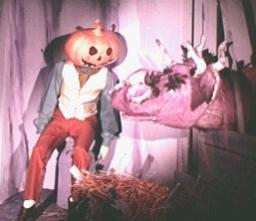 Tip
naturally enough, does not want to become a statue. Unnaturally
enough, he has to sing a song about it. As hard as it watching
him trying to act, watching him attempt to sell a song –
and it was written with no eye toward his abilities, so his voice
cracks and he has to gasp for breath in awkward places – is a survival course all on its own. After tormenting us, Tip
decides to run away, taking Jack with him. He also steals the
Powder of Life from the sleeping Mombi in a stultifyingly unsuspenseful
sequence.
Tip
naturally enough, does not want to become a statue. Unnaturally
enough, he has to sing a song about it. As hard as it watching
him trying to act, watching him attempt to sell a song –
and it was written with no eye toward his abilities, so his voice
cracks and he has to gasp for breath in awkward places – is a survival course all on its own. After tormenting us, Tip
decides to run away, taking Jack with him. He also steals the
Powder of Life from the sleeping Mombi in a stultifyingly unsuspenseful
sequence.
Tip’s plan involves journeying south to the
Emerald City and petitioning the Scarecrow for asylum. This leads
to Tip recounting the events of the original 1939 movie and explaining
the color-coding of Oz to Jack. Oh, good, let’s give more
long speeches to the kid who can’t act, and at the same time,
remind everyone of a much better movie.
But... I feel like I have to pause to recuse myself
here, for two reasons: first, the speech is somewhat necessary,
not only for those who somehow might not be aware of the mythology
of Oz, but also for those (like Dr. Weasel) who were wondering "Where’s Dorothy?" (Dorothy does return to Oz,
but not until the third book, Ozma
of Oz). Second, I’m starting to feel like I’m
ragging on Channy Mahon a little too much. Then I remember he’s
supposed to be the star, and my wishing that someone had
given this speech to the papier-mache cow is only natural.
Tip finally decides to stop annoying us and go
to sleep. Anyone suspecting the movie is willing to give us a
break, however, is in for a rude awakening when a pink-garbed
beauty contestant appears and starts crooning a ballad. Though
the movie won’t bother to introduce us to her for another
half-hour or so, this is Glinda the Good Fairy (Hilary Lee Gaess).
Glinda has become a Fairy, I suppose, so as not to confuse the
target audience with any moralistic folderol such as the possibility
of witches being good.
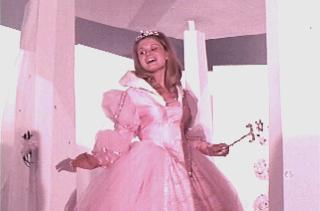 Glinda
is wearing someone’s idea of a Cinderella ball gown, pink
with a high collar. If you gave this dress to some little girl
so she could play princess, she would likely run away crying,
and who could blame her? Also, whoever is doubling as hair stylist
should be shot – the fall draped over her tiara looks dreadful.
Even by high school pageant standards.
Glinda
is wearing someone’s idea of a Cinderella ball gown, pink
with a high collar. If you gave this dress to some little girl
so she could play princess, she would likely run away crying,
and who could blame her? Also, whoever is doubling as hair stylist
should be shot – the fall draped over her tiara looks dreadful.
Even by high school pageant standards.
Glinda belts out her ballad, Try To Touch A
Star, while Tip sleeps fitfully, probably because someone
nearby is howling an overproduced song. During this song, that
is what we are given to look at: Glinda lip-syncing, Tip sleeping,
and Jack scratching his plastic pumpkin head. I can almost hear
the deafening sound of bored children shuffling in their seats.
Eventually Glinda runs out of song and vanishes,
and Jack, since he can’t sleep (cripes, who could?) decides
to do something useful like finding the Emerald City. When dawn
breaks, Jack has not returned, and Tip is awakened by the arrival
of a drum majorette. Okay, not really, it’s General Jinjur
(Caroline Berner), on the way to join her all-girl "Army
of Revolt". The two proceed to try to out-pout each other.
"I was gonnaemmerulcity," explains the mush-mouthed
Tip, and since Jinjur’s mission is to conquer said city,
she declares Tip to be a prisoner of war and commands him to carry
her bags. Tip agrees, since as a prisoner, he gets to eat some
of her sandwiches.
Jack, meanwhile, has located the somewhat less-than-magnificent
Emerald City on another soundstage, which is pretty surprising,
considering that he's been directed to stagger about like the
Frankenstein Monster on a Jagermeister bender. Dang, but the place
has shrunk since the 30s… must be all the downsizing and
privatization since the Scarecrow took over.
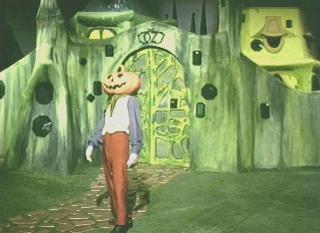 With
the arrival of the Scarecrow (Michael R. Thomas), at least we
finally get another decent actor. If you're keeping score, the
last person who showed any proficiency in the field was Mombi,
a half-hour ago. And if Thomas' rather loose-jointed portrayal
gives the impression that the Scarecrow is gay, well, I'm just
going to chalk that up to my jaundiced adult eye.
With
the arrival of the Scarecrow (Michael R. Thomas), at least we
finally get another decent actor. If you're keeping score, the
last person who showed any proficiency in the field was Mombi,
a half-hour ago. And if Thomas' rather loose-jointed portrayal
gives the impression that the Scarecrow is gay, well, I'm just
going to chalk that up to my jaundiced adult eye.
On yet another soundstage, Jinjur addresses her
crack army of drum majorettes as they prepare to march on the
Emerald City, armed with knitting needles. As this conference
(and later scenes) will demonstrate, there is a reason why Jinjur
is the leader: she's the only one that can come close to acting.
And since we haven't had a song in nearly ten minutes, Jinjur
belts out "On This Great Take-Over Day", with the scintillating
chorus:
On this great take-over day,
Throw your pencils and books
away!
Give them to your brother Gus
No more homework – for us! |
I can envision the pre-production meeting, where
Barry Mahon told the lyricist that Jinjur and her army are basically
revolting against having to do housework. You know, chores, stuff
like that. And somehow "housework" got turned into "homework"… And of the resulting production number, it is probably best to
only say that precision marching is not the Army of Revolt's forte.
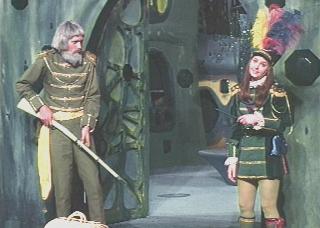 So
the army storms the flimsy plywood gates of Oz. Actually, they
first stop to palaver with the Doorman, a scene rife with line
delivery more wooden than the doors and, of course, the sight
of Tip adjusting his costume. The Doorman first asks the army
to wait a minute while he saunters back into the Emerald City,
then returns to menace them with a musket. When asked if he would "shoot a defenseless girl", the shocked doorman responds that
he would never do that, and besides, the gun isn't loaded. Perhaps
Sheriff Andy didn't come 'round to dispense the bullet that day.
Anyway, Tip takes advantage of this Komedy to run to the central
palace and warn the Scarecrow of the coming revolution.
So
the army storms the flimsy plywood gates of Oz. Actually, they
first stop to palaver with the Doorman, a scene rife with line
delivery more wooden than the doors and, of course, the sight
of Tip adjusting his costume. The Doorman first asks the army
to wait a minute while he saunters back into the Emerald City,
then returns to menace them with a musket. When asked if he would "shoot a defenseless girl", the shocked doorman responds that
he would never do that, and besides, the gun isn't loaded. Perhaps
Sheriff Andy didn't come 'round to dispense the bullet that day.
Anyway, Tip takes advantage of this Komedy to run to the central
palace and warn the Scarecrow of the coming revolution.
The Scarecrow opines that being King sucks anyway,
and rather easily tosses off his crown. He leaves through the
back door of Oz with Tip and Jack, as the Army of Revolt goes
about prying the jewels from the walls of the Emerald City. Wimmin!
Always with the jewelry!
As continues to happen whenever we skip portions
of Baum's book, a poorly-drawn map of Oz appears as a narrator
explains that Tip has convinced the Scarecrow that for the good
of the people of the Emerald City, he should seek the help of
his friend, the Tin Woodman (Al Joseph), who is charge of the
land of the Winkies, late of the Wicked Witch of the West. The
Woodman receives his old friend joyfully, adding that he hopes
nothing is seriously wrong. "If I may, sir," drones Tip, "I'll
explain." Despite the screams of the audience, Tip brings the
Woodman up to speed, and in a flash of hubris worthy of
Marcus Brutus, the Woodman decrees that they four ("and my axe!")
will be enough to strike terror into the hearts of "those naughty
girls".
Back at the Emerald City, Jinjur decress that
there shall be no curfew, and everyone will sleep as late as they
want. Yep, looks like the Democrats are back in charge again.
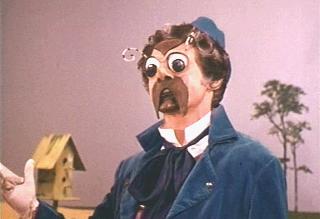 Back
at the map of Oz, we are informed that our four heroes have set
back out for the Emerald City. Tip pauses to rest, and in doing
so, 1) catches a mouse, which
he assures us wants to travel with them, and 2), makes the acquaintance of "H.M. Wogglebug, T.E."
(Gil Fields), a mansized insect with cardboard eyes and moustache.
The initials stand for "Highly Magnified" and "Thoroughly Educated",
incidentally. Wogglebug offers to tell Tip how he came to be "Highly
Magnified" and "Thoroughly Educated" as they walk to the Emerald
City, which is likely a good thing, as in the book this takes
two chapters and twenty pages.
Back
at the map of Oz, we are informed that our four heroes have set
back out for the Emerald City. Tip pauses to rest, and in doing
so, 1) catches a mouse, which
he assures us wants to travel with them, and 2), makes the acquaintance of "H.M. Wogglebug, T.E."
(Gil Fields), a mansized insect with cardboard eyes and moustache.
The initials stand for "Highly Magnified" and "Thoroughly Educated",
incidentally. Wogglebug offers to tell Tip how he came to be "Highly
Magnified" and "Thoroughly Educated" as they walk to the Emerald
City, which is likely a good thing, as in the book this takes
two chapters and twenty pages.
Back at the Emerald City,
however, life is not all beer and skittles for the new queen (whatever
the hell "skittles" are…). The water system needs to be upgraded,
and the Scarecrow's reluctance to raise taxes has left the treasury
empty. "Then raise taxes!" says Jinjur (see? I told you they were
Democrats! * ). "I'll have to tax your
girls, too, since they are now residents." "They don't have any
money. Tax the old people!" Somebody needs to introduce this girl
to the joys of deficit spending. Then members of the Army of Revolt
show up to complain that they're hungry, because their moms always
handled the meals and none of them know how to cook.
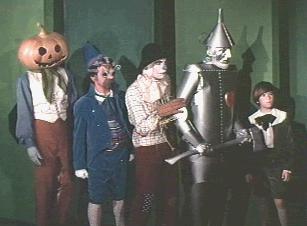 Into
this study of domestic policy run amuck come our heroes, who quickly
find that the Woodman's axe is no match for Jinjur's grip of ethics;
she points out that the throne belongs to whoever can sit on it,
and by attempting to overthrow her, they are breaking the
law. This puts our rather dim collection of heroes into a moral
quandry, and they surrender. Tip, however, wants to let his new
mouse go free, and (of course) at the sight of the rodent, Jinjur
and her Army desert the palace, screaming. Komedy! The
mouse, having served her purpose, will now vanish from the movie.
Into
this study of domestic policy run amuck come our heroes, who quickly
find that the Woodman's axe is no match for Jinjur's grip of ethics;
she points out that the throne belongs to whoever can sit on it,
and by attempting to overthrow her, they are breaking the
law. This puts our rather dim collection of heroes into a moral
quandry, and they surrender. Tip, however, wants to let his new
mouse go free, and (of course) at the sight of the rodent, Jinjur
and her Army desert the palace, screaming. Komedy! The
mouse, having served her purpose, will now vanish from the movie.
Our heroes are not out of the cheaply constructed
woods, however; though they bolt the doors, the palace is still
surrounded by the Army of Revolt. The girls are getting hungry,
and Pumpkinhead is probably looking pretty good (and the Wogglebug
is doubtless wondering why he threw in with this bunch of losers).
Tip, however, lashes together a creature made of sofas, the mounted
trophy head of a gump (a woodland creature of Oz) and palm frond
wings. Employing the stolen Powder of Life, he does the Herbert
West bit, and they use this animated amalgamation to fly to the
pink pylon-and-scrim palace of Glinda, the Good Wit --- Fairy.
The Good Fairy. The Gump, having served its purpose, will
now vanish from the movie.
First, Glinda has to sing a song called "I Have
Watched Over You", in which she assures us "I know when you've
been good, I know when you've been bad", which sounds sort of
familiar, I just can't put my finger on it… and she hasn't
gotten any better at lip syncing, either, but her fall does look
better in this scene.
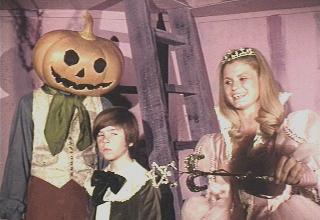 The
Scarecrow tells Glinda about his doubts concerning the ownership
of the throne of Oz, prompting Glinda to deliver a brief history
lesson (what is with giving the exposition to all the bad
actors? Wasn't there some way to give this to the Scarecrow or
the Wogglebug, who at least show some presence?). When
the previous Wizard (remember him?) usurped the throne of the
Emerald City, he hid away the rightful heir, Princess Ozma. (Glinda
was apparently vacationing at Ozumel or something while all this
was going on). Glinda has never been able to find Ozma, though
she does know that the Wizard made several trips up north to visit
a woman named Mombi…
The
Scarecrow tells Glinda about his doubts concerning the ownership
of the throne of Oz, prompting Glinda to deliver a brief history
lesson (what is with giving the exposition to all the bad
actors? Wasn't there some way to give this to the Scarecrow or
the Wogglebug, who at least show some presence?). When
the previous Wizard (remember him?) usurped the throne of the
Emerald City, he hid away the rightful heir, Princess Ozma. (Glinda
was apparently vacationing at Ozumel or something while all this
was going on). Glinda has never been able to find Ozma, though
she does know that the Wizard made several trips up north to visit
a woman named Mombi…
Deciding that it is the dramatically appropriate
time to confront Mombi, Glinda spirits them all away to Hovel
#1 (and I note that Glinda's Magic Bubble has been thriftily replaced
by Glinda's Magic Baby Spotlight). Confronted with Glinda's Lie
Detecting Wand, Mombi eventually admits that the Wizard brought
her Ozma as a baby, offering her the proposition what he would
allow her to practice sorcery if she would never let the true
heir out of her sight. This she did, and to better hide Ozma,
she turned her into a boy – in other words, Tip is really
Ozma.
Well, that would seem to solve everything, except
that the sullen, whiney Opie doesn't want to be a girl. His intrepid
companions assure him that they'll still be his friends, and for
the good of the Emerald City, he has to be turned back into Ozma.
Glinda further muddies the water with this bewildering little
speech:
|
GLINDA
It
is not exactly that you are going to be a girl. You're going
to remain Tip. The girl is Ozma. You are not exactly Ozma
now, you have grown into an adventurous boy. When I transform
you,Ozma will be the girl, and Tip will be your spirit,
a wonderful, adventurous spirit, that will float out into
the land beyond, and become a part of every little boy.
|
The hell-? This is sounding increasingly like a death sentence to me, new
age philosophy or no. Tip, however, buys it hook, line, sinker,
and a packet of chips. Glinda teleports them all to the Emerald
City, and gives Jinjur her walking papers. The transformed Ozma
(Joy Webb) regards her old friends and says tonelessly, "I have
a feeling that I know you wall." Yep. She's Tip, alright.
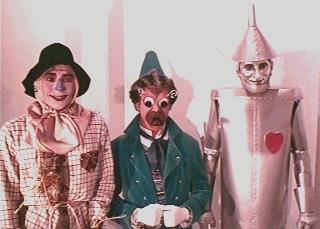 Glinda
vanishes, the Wogglebug prepares to educate Ozma (which would
later be subject of a movie starring Michael Caine), the Tin Woodman
goes home, followed by the Scarecrow and Jack, who will be Ozma's "Ambassadors of Good Will"*. Cut to the gates
of the Emerald City, as that blasted "Wonderful Land of Oz" song
plays. Jinjur's Army of Revolt mopes out into the land, looking
like they really need to sleep off last night's bender, or maybe
they just came in from "The Party" segments of Rowan and Martin's
Laugh-In. Eventually, Jack, the Scarecrow and Tin Woodman
exit too, at least trying to make it look like they're singing
the song. The end.
Glinda
vanishes, the Wogglebug prepares to educate Ozma (which would
later be subject of a movie starring Michael Caine), the Tin Woodman
goes home, followed by the Scarecrow and Jack, who will be Ozma's "Ambassadors of Good Will"*. Cut to the gates
of the Emerald City, as that blasted "Wonderful Land of Oz" song
plays. Jinjur's Army of Revolt mopes out into the land, looking
like they really need to sleep off last night's bender, or maybe
they just came in from "The Party" segments of Rowan and Martin's
Laugh-In. Eventually, Jack, the Scarecrow and Tin Woodman
exit too, at least trying to make it look like they're singing
the song. The end.
The most dismaying thing about The Wonderful
Land of Oz is that it is possible to discern an earnest attempt
to make a movie version of L.
Frank Baum's book. Sure, there's some abridgement, at least
as much as evidenced in the '39 movie, and a lot of concessions
to budget. Oz seems terribly under-populated, for instance,
except for as legion of mini-skirted young ladies who are doubtless
left over from Mahon’s more salacious movies. But there is
obviously a desire, at the core of this, to bring the book to
the screen. It is just a shame that the desire is not backed up
by things like budget or talent.
The sets really do look like they were
constructed for the stage; trees and flowers have a cut-out, two
dimensional look to them, and buildings are far too often obviously
made of painted wood. The cyclorama is frequently visible, and
more than once people cast shadows on the canvas sky. There are
long stretches where the camera is simply locked down as the actor
speechifies.
And the acting – oy God, the acting! Mombi,
the Scarecrow, Tin Woodman and Wogglebug all acquit themselves
well, but special ire must be set aside for the star, Channy Mahon.
And even then, you know in your heart,it’s not really his
fault. It’s the job of the producer or the 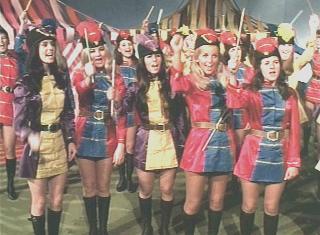 director
to say, "Look, the kid isn’t working out, we need to
recast." Unfortunately, the producer and director were the
same person, and that person was also Channy’s father, Barry
Mahon. There is a reason why nepotism is considered a bad thing.
director
to say, "Look, the kid isn’t working out, we need to
recast." Unfortunately, the producer and director were the
same person, and that person was also Channy’s father, Barry
Mahon. There is a reason why nepotism is considered a bad thing.
My grousing at some length is going to lead some
of you to view the rating for this movie, below, with some surprise.
But I remind you that this rating reflects not the movie's technical
quality, but the quality of the experience of watching it. I am
rarely surprised or dumbfounded by a movie, and this one did both.
This movie is unquestionably bad (and its companion on the Something
Weird DVD, Jack and the Beanstalk, is even worse),
but it is also, for me, a gateway to a new, undiscovered land:
the terra incognita of the sixties kiddie matinee, a land which
seems as least as wondrous as Oz at this remove, full of bad songs
and worse acting. It's like I've stumbled on a box full of previously
undiscovered Ed Wood movies, and to a crap cineaste like
myself, that is a powerful good feeling.